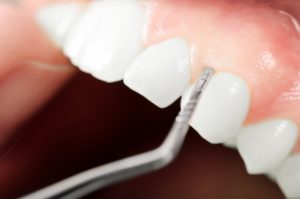
When you look at your smile in the mirror, does it seem like your teeth have gotten bigger or longer? This optical illusion doesn’t occur because your enamel grew, but it happened because your gums are shrinking. Yes, instead of longer teeth, you may have receding gums. This problem can occur for multiple reasons, and with the right know-how, you can prevent gum recession altogether. Keep reading to learn about the most common reasons for gum recession and what you can do to protect your smile.
Why Are Your Gums Receding?
There are multiple reasons why your gums may be receding, but the most common is gum disease. Also called periodontal disease, this is a problem that occurs as a result of poor oral hygiene. When plaque and bacteria build up along the gumline, it can lead to gum disease—an infection of the gums. In its earliest stage, gum disease may show up in red or sensitive tissue. However, if it persists, it can eventually result in gum recession. Left untreated, this problem can lead to symptoms even more severe than receding gums, including permanent tissue damage, bone loss, and tooth loss.
There are a few other common causes of gum recession such as:
- Poor brushing methods: Aggressively brushing with a hard-bristled toothbrush can lead to gum recession and extra wear on enamel.
- Bruxism: Also known as teeth grinding, this extra pressure on your smile leads to gum recession.
- Tongue or lip piercings: While they may look cool, these piercings can irritate the gums, causing them to recede.
- Tobacco use: Gum recession can also be caused by smoking and tobacco use. Plus, tobacco makes it harder for your gum tissue to heal once damaged.
Can You Prevent Receding Gums?
Thankfully, these problems can be completely prevented if you take the right steps:
- Brush properly: Use a soft-bristled toothbrush, massaging your teeth and gums rather than scrubbing them for 2 minutes each session.
- Wear a nightguard: Using a nightguard for your bruxism can protect your teeth from grinding, and therefore minimize your risk of recession.
- Gum disease prevention: Practice a good oral healthcare routine with brushing, flossing, and even using a non-alcoholic oral rinse. Also, be sure to see your dentist in Arlington Heights at least twice a year. Sometimes, gum disease doesn’t show any signs or symptoms, making routine checkups an incredibly important step for prevention.
Now that you know more about what causes gum recession, keep these easy yet helpful tips in mind to prevent this problem altogether!
About the Practice
At Westgate Dental Care, we have a team of 5 experienced dentists who have a passion for quality oral health care. They’re open early and late, plus they are even available on Saturdays to ensure that busier patients can get amazing dentistry. For any questions, they can be reached through their website or by phone at (847) 577-7171.
